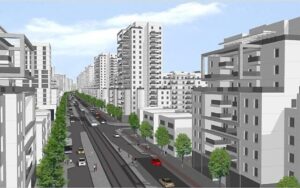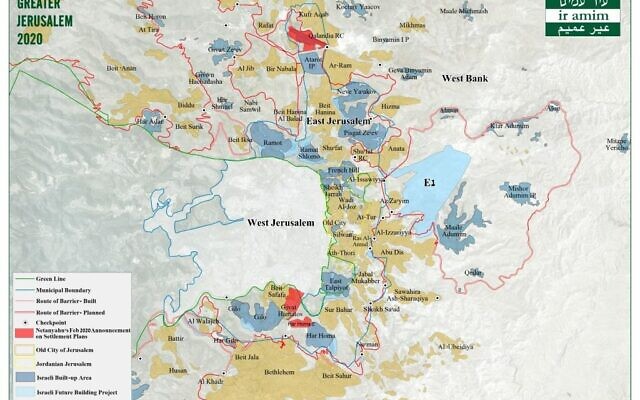Municipal panel gives initial backing to proposal to build thousands of new homes for ultra-Orthodox in Atarot, adjacent to Palestinian neighborhoods
By TOI STAFF 24 November 2021, 9:20 pm

Architects’ plans for the new neighborhood in the Atarot industrial area in East Jerusalem. (Jerusalem Municipality)
The Jerusalem City Council’s Planning and Building Committee gave its backing Wednesday to a plan for a new neighborhood slated to house tens of thousands of ultra-Orthodox Jews at an abandoned East Jerusalem airport. The city’s support marks an early step forward for the proposal, which is to be considered by the District Committee for Planning and Building, under the auspices of the Finance Ministry, on December 6.
The new neighborhood is set to be located at the site of the Atarot Airport, sandwiched between the Palestinian neighborhood of Kafr Aqab and the Qalandiya refugee camp in the far northwest corner of the city largely beyond the West Bank security barrier.
The plan includes the construction of 9,000 housing units over 1,243 dunams (307 acres) of land.
The airport site, which was closed after the eruption of the Second Intifada in 2000, was designated in former US president Donald Trump’s “plan of the century” as a Palestinian tourism zone.
Following the city panel’s approval, the Atarot project will still require several subsequent authorizations before ground can be broken. The advancement of the plan has been stalled for several years due to international pressure.
An Israeli government official said the project is in the early stages of planning, and that it will likely be years before it comes up for government approval.
“Jerusalem is a living, breathing, growing capital city of the state of Israel,” Deputy Mayor Fleur Hassan-Nahoum said. “The housing project will provide thousands of much-needed housing units.”
Ofer Berkowitz, chairman of the municipal opposition, welcomed the move, calling it a “historic permit for construction in Jerusalem.”
“There was a huge pessimism at the beginning of the road that we would not be able to bring about the establishment of the neighborhood, but here it happened today,” he said.
Backing for the Atarot project comes as Israel is quietly advancing controversial construction projects in and around Jerusalem without making major announcements that could anger the Biden administration. Critics say the latest moves, while incremental, pave the way for rapid growth once the political climate changes.
Last month a local planning committee in Jerusalem approved the expropriation of public land for the controversial Givat HaMatos neighborhood, which critics say would largely cut Palestinian parts of East Jerusalem off from the southern West Bank.
The same committee advanced plans for the construction of 470 homes in the existing East Jerusalem neighborhood of Pisgat Zeev.
A military body meanwhile scheduled meetings to discuss a planned settlement of 3,400 homes on a barren hillside outside Jerusalem known as E1. Critics say building in the area would effectively separate the northern and southern parts of the West Bank, making it impossible to establish a viable Palestinian state alongside Israel.
“The fact that simultaneously all of these very controversial plans that have been longstanding international red lines have now been advancing … is very indicative that the Israeli government intends to advance and ultimately approve these plans,” said Amy Cohen of left-wing group Ir Amim last month.

A map showing the controversial Givat HaMatos neighborhood in southern Jerusalem, bordering Gilo and Beit Safafa (Credit: Peace Now)
Israel regards all of East Jerusalem as part of its undivided capital and says it should be able to build there at its own discretion. But most of the international community has never recognized Israel’s annexation of East Jerusalem and regards Jewish neighborhoods there as settlements.
Every Israeli government since 1967 has expanded Jewish neighborhoods in East Jerusalem and settlements in the West Bank, territories Israel captured in the Mideast war that year which the Palestinians want for their future state. The Palestinians view the settlements and Jewish neighborhoods in East Jerusalem— now housing some 700,000 people — as the main obstacle to peace, and most of the international community considers them illegal.
US President Joe Biden’s administration has criticized settlement construction as an obstacle to eventually reviving the long-moribund peace process but has not demanded a freeze. In 2010, an announcement of approval for some 1,600 homes for ultra-Orthodox Jews in another part of East Jerusalem during a visit by Biden, then the vice president, aggravated a diplomatic rift that festered throughout Barack Obama’s presidency.
Buses parked at what was once Jerusalem Airport at Atarot; in the background, the high-rises of the Kafr Aqab neighborhood — formally part of Jerusalem but outside the security barrier, November 2021. (David Horovitz / Times of Israel)
Biden, who as president is prioritizing other challenges like COVID-19, China and climate change, appears keen to avoid a showdown with Israel, a close US ally.
“We have been clear publicly and in private about where we stand on settlement activity and on annexation,” State Department spokesman Ned Price said last month. “We oppose any unilateral steps that put a two-state solution further out of reach.”
Israel’s political system is dominated by pro-settlement parties and its new prime minister, Naftali Bennett, is opposed to a Palestinian state. But he heads an unwieldy coalition of parties from across the political spectrum — some opposed to settlements — and appears to be seeking a middle ground that would sideline the issue at home and abroad.
AP contributed to this report.




The whole of Jerusalem belongs to Israel and the Jewish people, so let them build wherever they like! G-d will bless them.